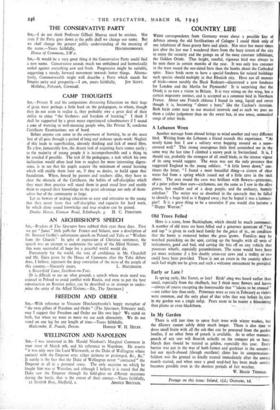WHEN correspondents from Germany wrote about a possible line of
defence among the old fortifications of Cologne I could think only of one inhabitant of those grassy forts and glacis. Not once but many times just after the last war I wandered there from the busy streets of the city to enjoy the serenity and the goings on of the most constant inhabitant, the Golden Oriole. That bright, tuneful, vigorous bird was always to be seen there in certain months of the year. It was only less constant to the trees round the out-dated forts than the hawks about the Cathedral spire. Since birds seem to have a special fondness for ruined buildings such species should multiply in that Rhenish city. Have not all manner of birds—most notably the Black Redstart—discovered a new fondness for London and the Merlin for Plymouth? It is surprising that the Oriole is so rare a visitor to Britain. It is very strong on the wing, has a certain migratory instinct, and is accepted as a common bird in Northern France. About one French chateau I found its song, liquid and sweet though it is, becoming "almost a bore," like the Cuckoo's iteration. Both birds come near to our musical intervals and as such we pass on them a colder judgement than on the sweet but, in one sense, unmusical songs of other birds.
A Lebanon Wren
Another message from abroad brings to mind another and very different bird. Writing from the Lebanon a friend records this experience. "At nearly 6,000 feet I saw a solitary wren hopping around on a snow- covered wall." This strong courageous little bird astonished me in the same way the last time I climbed a snowy peak in Switzerland. It is, I should say, probably the strongest of all small birds, as the intense vigour of its song would suggest. The wren was not the Only presence that suggestO England to the young soldiers. "A little lower down," con- tinues the letter, "I found a most beautiful thing—a cistern of clear water fed from a spring which issued out of 'a little cave in the rock above. The area round the cave was brilliant with flowers—primroses, of a paler yellow than ours—cyclamens, not the same as I saw in the olive groves, but smaller and of a deep purple, and the ordinary, homely" coltsfoot." The writer was so absorbed in the spectacle that he failed to identify a huge bird as it flapped away ; but he hoped it was a latinner- gier! It is a great thing to be a naturalist if you would also become a "Happy Warrior."
Old Trees Felled -
Here is a scene, from Buckingham, which should be much _commoner.
A number of old trees are been felled and a generous quantum- lop and top" is given to each Weal family for the/price of 5s., on condition that the booty is..removed before -the grass grows. Families- may be watched picnicking on the spot, cutting up the boughs with- all -sorts of instruments, good and bad, and carting the bits off on any vehicle that possesses wheels, especially perambulators. The scene would have been yet more welcome if a few double cross-cut saws and a trolley -of. two could have been provided. There isnot. an estate in the country where such fuel might not be given and such a -welcome amusement be proirided.
Early or Late ?
Is spring early, like Easter, or late? Birds' song was heard earlier than usual, especially from the chaffinch, but I think most flowers and leaves —always of course excepting the honeysuckle that " 'sdains to be crossed" —are rather late than early. Primroses were as rare in February as violets were common, and the only plant of that tribe that was before its time in my garden was a single oxlip. Pears seem to be nearer a blossoming than plums or even blackthorn.
In My Garden There is still just time to spray fruit trees with winter washes, but the dilatory cannot safety delay much longer. There is also time to dress small fruits with all the ash that can be procured from the garden bonfire, if no other form of potash is available. As to other manures, gourds of any sort will flourish actbally on the compost pit or heap. March dust should be treated as golden, especially this year. Every barrier was put in the way of both farmer and gardener. in the. autumn ; but our muds-abused (though excellent) clime has its compensations. Seldom was the ground so kindly treated immediately after the sowing mouth started, and when once a good seed-bed has been made sowing becomes possible even in the shortest periods of fair weather.
W. BEACH ThOMAS.
Postage on this issue: Inland, lid.; Ovirseas, td.


























 Previous page
Previous page